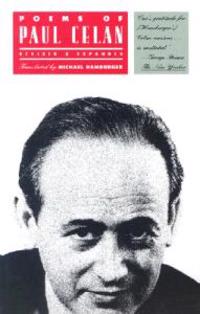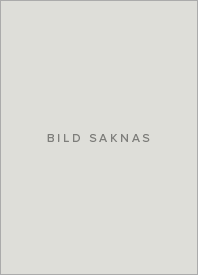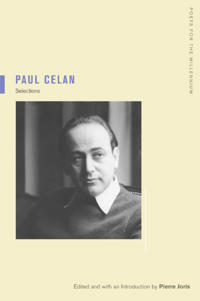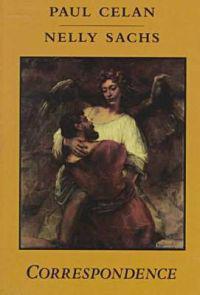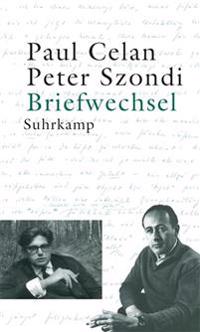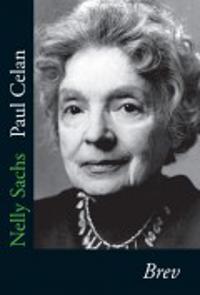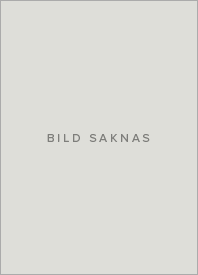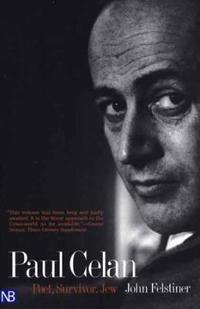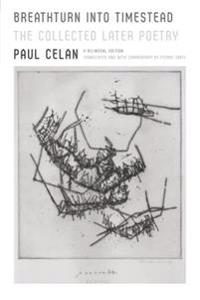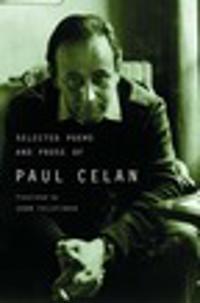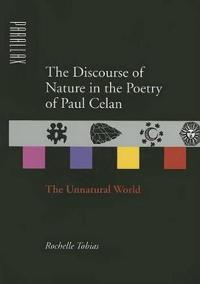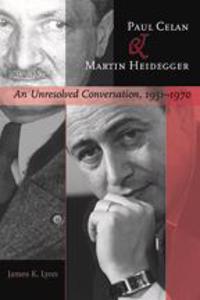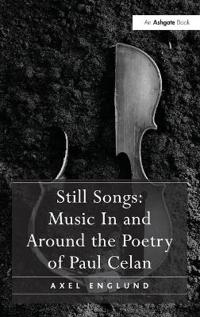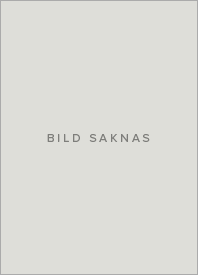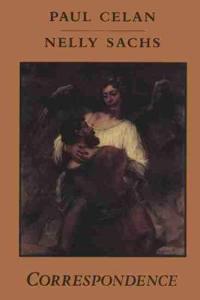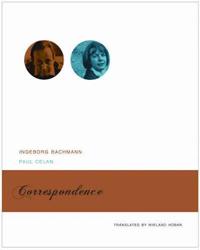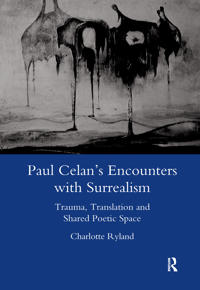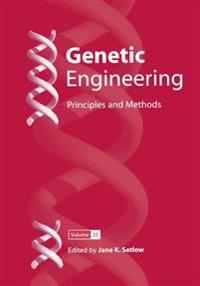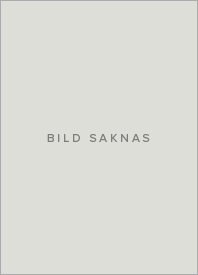Poems of Paul Celan (Pocket)
avPaul Celan, Michael Hamburger, Paul Celan
ISBN: 9780892552764 - UTGIVEN: 200211Paul Celan is one the twentieth century's most essential poets, and twenty-two years after its publication, Poems of Paul Celan continues to be the single truest access for English-speakers to this poet's work. This new edition adds ten more poems and a significant essay, "On Translating Celan" by M[...]
Paul Celan Collected Prose (Häftad)
avPaul Celan, Rosemarie Waldrop
ISBN: 9780415967235 - UTGIVEN: 200303Paul Celan (Häftad)
avPaul Celan
ISBN: 9780520241688 - UTGIVEN: 200503The best introduction to the work of Paul Celan, this anthology offers a broad collection of his writing in unsurpassed English translations along with a wealth of commentaries by major writers and philosophers. The present selection is based on Celan's own 1968 selected poems, though enlarged to in[...]
Paul Celan, Nelly Sachs: Correspondence (Häftad)
avPaul Celan, Nelly Sachs
ISBN: 9781878818713 - UTGIVEN: 199809Briefwechsel Paul Celan / Peter Szondi (Inbunden)
avPaul Celan, Peter Szondi
ISBN: 9783518417140 - UTGIVEN: 2005-08Nelly Sachs, Paul Celan. Brev (Inbunden)
avNelly Sachs, Paul Celan
ISBN: 9789172472730 - UTGIVEN: 201109Käre diktare Paul Celan, nu har jag fått Er adress från förlaget och kan personligen tacka Er för den genom-gripande upplevelse som Era dikter har givit mig. Ni ser mycket av detta själsliga landskap som döljer sig bakom allt närvarande, och har kraften att ge uttryck åt hemligheten som sak[...]
Poems of Paul Celan Rev (Inbunden)
avP Celan
ISBN: 9780892552757 - UTGIVEN: 200211Paul Celan is one the twentieth century's most essential poets, and twenty-two years after its publication, Poems of Paul Celan continues to be the single truest access for English-speakers to this poet's work. This new edition adds ten more poems and a significant essay, "On Translating Celan" by M[...]
Selected Poems (Storpocket)
avPaul Celan
ISBN: 9780140189209 - UTGIVEN: 1996-06One of the major twentieth-century European poets, Paul Celan wrote poetry of exceptional linguistic brilliance and intensity drawn from his experiences, particularly of the war years and the loss of his parents in the death camps. In his verse he sought to express 'not only what the experience felt[...]
Paul Celan (Häftad)
avJohn Felstiner
ISBN: 9780300089226 - UTGIVEN: 200102Paul Celan, Europe's most compelling postwar poet, was a German-speaking, East European Jew. His writing exposes and illumines the wounds that Nazi destructiveness left on language. John Felstiner's sensitive and accessible book is the first critical biography of Celan in any language. It offers new[...]
Breathturn Into Timestead: The Collected Later Poetry: A Bilingual Edition (Inbunden)
avPaul Celan
ISBN: 9780374125981 - UTGIVEN: 2014-11Haunting poems from one of the twentieth century's groundbreaking poets
Paul Celan, one of the greatest German-language poets of the twentieth century, created brilliant works of pure musicality and stark imagery in tension with the haunting memories of his life as a Romanian Jew during the Holoc[...]The Selected Poems and Prose of Paul Celan (Häftad)
ISBN: 9780393322248 - UTGIVEN: 2002-02Paul Celan was born in 1920 in the East European province of Bukovina. Soon after his parents, German-speaking Jews, had perished at the hands of the Nazis, Celan wrote "Todesfuge" ("Deathfugue"), the most compelling poem to emerge from the Holocaust. Self-exiled in Paris, for twenty-five years Cela[...]
The Discourse of Nature in the Poetry of Paul Celan
ISBN: 9780801882906 - UTGIVEN: 2006-06Paul Celan has long been regarded as the most important European poet after 1945 but also the most difficult owing to the numerous references in his work to his personal history and to a cultural heritage spanning many disciplines, centuries, and languages. In this insightful study, Rochelle Tobias [...]
Paul Celan and Martin Heidegger (Inbunden)
avJames K. Lyon
ISBN: 9780801883026 - UTGIVEN: 2006-01This work explores the troubled relationship and unfinished intellectual dialogue between Paul Celan, regarded by many as the most important European poet after 1945, and Martin Heidegger, perhaps the most influential figure in twentieth-century philosophy. It centers on the persistent ambivalence C[...]
Paul Celan: 70 Poems (Häftad)
ISBN: 9780892554249 - UTGIVEN: 2013-03Paul Celan is the preeminent poet of the Holocaust. His chilling, haunted verse, evocative and agonizingly spare, is among the essential writing of the modern age. Paul Celan: 70 Poems is a portable selection of some of his most essential work, translated by Michael Hamburger (1924-2007), who for mo[...]
Still Songs: Music in and Around the Poetry of Paul Celan (Inbunden)
avAxel Englund
ISBN: 9781409422624 - UTGIVEN: 201203What does it mean for poetry and music to turn to each other, in the shadow of the Holocaust, as a means of aesthetic self-reflection? How can their mutual mirroring, of such paramount importance to German Romanticism, be reconfigured to retain its validity after the Second World War? These are the [...]
Corona: Selected Poems of Paul Celan (Häftad)
ISBN: 9781581771275 - UTGIVEN: 2013-11Poetry. Bilingual Edition. Translated from the German by Susan H. Gillespie. Paul Celan, arguably the mid-20th century's most important German-language poet, is commonly pigeonholed as a poet of the Holocaust--a term, however, he never used. Undoing facile assumptions about Celan, CORONA charts a mo[...]
Paul Celan, Nelly Sachs
ISBN: 9781878818379 - UTGIVEN: 2011-05Here are the letters between Nelly Sachs (1891-1970), recipient of the 1966 Nobel Prize for Literature, and the great German-speaking poet Paul Celan (1920-1970). Their correspondence lasted from 1954 until Celan's death by suicide. Sachs died the day Celan was buried. 'What Paul Celan once said of [...]
Correspondence (Inbunden)
avIngeborg Bachmann, Paul Celan, Wieland Hoban
ISBN: 9781906497446 - UTGIVEN: 201008Paul Celan (1920-70) is one of the best-known German poets of the Holocaust; many of his poems, admired for their spare, precise diction, deal directly with its stark themes. Austrian writer Ingeborg Bachmann (1926-73) is recognized as one of post - World War II German literature's most important no[...]
Homage to Paul Celan (Häftad)
ISBN: 9781934851357 - UTGIVEN: 2012-03Poetry. Literary Nonfiction. Art. Jewish Studies. If there is a country named Celania--as Julia Kristeva once proposed--its holy texts are filled with doubt, and they overcome this doubt almost successfully, with words of wrenching, uncompromised beauty.... The book in your hands is not intended to [...]

